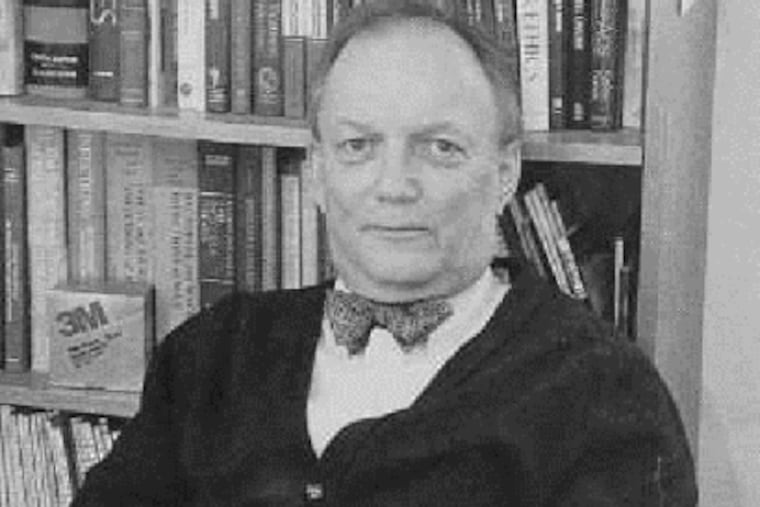Robert M. Swenson, infectious disease expert, professor emeritus at Temple, author and actor, has died at 84
He was at the forefront of groundbreaking research, treatment of patients, and the social implications of the AIDS epidemic in the early 1980s. He became an actor after his retirement in 2005.

Robert M. Swenson, 84, formerly of Mount Airy, founding chief of the infectious diseases section at Temple University’s Health Sciences Center, professor emeritus of medicine and microbiology, author, lecturer, and actor, died Thursday, March 31, of pneumonia at Sutter Medical Center in Sacramento, Calif.
An authority on epidemics, pandemics, plagues, and their social implications, Dr. Swenson was the founder and chief of Temple’s infectious diseases section from 1969 to 1982. He was chairman of the sciences center’s AIDS task force from 1986 to 2005, board member for an AIDS nursing home and senior living center in Philadelphia, and an expert courtroom witness in cases about AIDS and other infectious diseases.
His 17-page 1988 essay, “Plagues, History, and AIDS,” was printed in the American Scholar magazine and elsewhere around the world, translated into several languages, and noted as an important reference by other authors. “Infectious diseases have had a major influence on Western history,” he wrote.
His conclusion to the report was not comforting. “Although our advanced biotechnology has allowed us to apply sophisticated solutions to the biological problems of AIDS, our human responses have changed little from previous epidemics and hinder us from dealing effectively with many of the social problems that are part of the AIDS epidemic.”
During his 37-year career at Temple, Dr. Swenson saw patients, taught students, shared research, and wrote or cowrote more than 40 articles and book chapters, many of which led to improvements in medical procedures and social responses to diseases and other issues. “He particularly cherished his role teaching the next generations of physicians,” his family said in a tribute
He served on clinical, academic, and administrative committees; lectured on public health policy and the moral taboos of disease; and reviewed articles for medical journals. He earned research fellowships from the American Heart Association and was on the American Board of Medical Examiners and a fellow at the College of Physicians of Philadelphia.
“Bob had the kind of wide-ranging mind that appeals to intellectual dabblers,” said his friend Tom Purdom, a Philadelphia-based writer and editor.
When he retired in 2005, Dr. Swenson turned his attention to acting. He took classes at Temple and, using his keen sense of humor and talent for dramatic improvisation, earned roles in stage productions and independent films. His most memorable part was as an incompetent insurance agent in TV commercials for the law firm Lenahan & Dempsey.
For years afterward, folks who recognized Dr. Swenson from the ads would approach him and imitate his acerbic, drawn out “Oh, noooo” catchphrase. “He had a remarkable quickness of wit,” said his wife, Jean. “And he loved being around young people.”
Born June 19, 1937, in Chicago, Dr. Swenson graduated from Northwestern University in 1959 and Washington University School of Medicine in St. Louis in 1963. He was an intern and resident at Barnes Hospital, now Barnes-Jewish Hospital, at Washington University. He became an officer in the U.S. Public Health Service and completed research fellowships at the National Institutes of Health in Maryland.
He served a fellowship in infectious diseases at the University of Texas Southwestern Medical School before arriving at Temple in 1969. He met Jean MacBryde on a blind date, married her in 1961, and they had sons Kirk and Neil.
The family lived for a decade in West Philadelphia, and Dr. Swenson rode his bicycle across town to the Temple campus. They moved to Mount Airy in 1979, and he and his wife relocated to Davis, Calif., seven years ago.
Dr. Swenson was a tennis star as young man and later got so worked up when watching the Phillies, Eagles, and 76ers that he had to tape the games, find out who won later, and watch only if his team won. He liked jigsaw puzzles, and he and his wife and family spent summers in the Endless Mountains in northeastern Pennsylvania.
He read books on economics, political history, sociology, and Buddhism and embraced meditation. “He had a curious intellect,” his wife said. “He could see the big picture, but he was also good on the details.”
In addition to his wife and sons, Dr. Swenson is survived by four grandchildren, a sister, and other relatives.
A private service in California is scheduled for Sunday, May 29. A service in Philadelphia is to be held later.
Donations in his name may be made to the American Civil Liberties Union, 125 Broad St., 18th Floor, New York, N.Y. 10004, and American Friends Service Committee, 1501 Cherry St., Philadelphia, Pa. 19102.